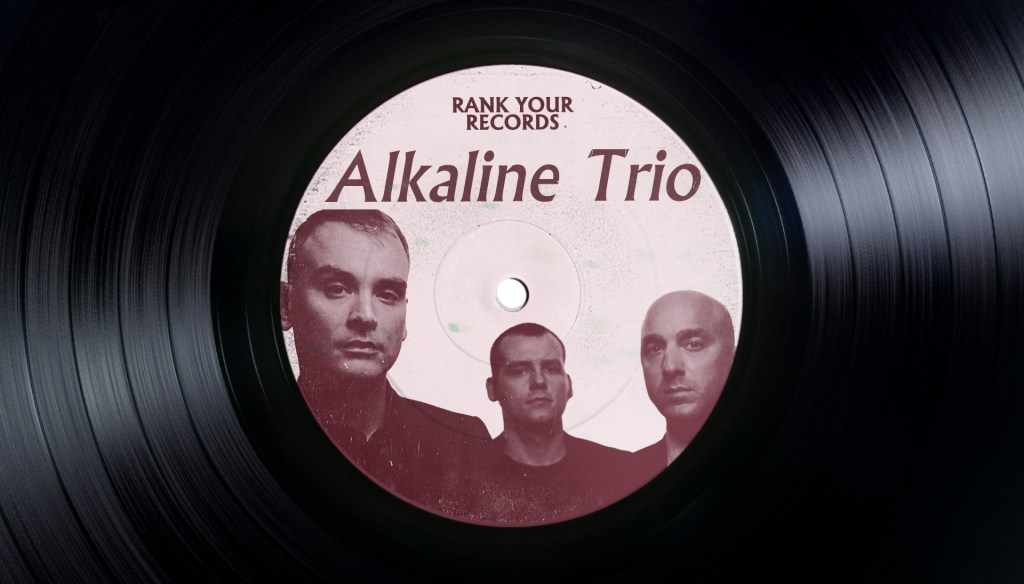In Rank Your Records, we talk to artists who have amassed substantial discographies over the years and ask them to rate their releases in order of personal preference.
To a certain part of the punk scene, Matt Skiba and Dan Andriano are like Lennon and McCartney. Fans have their favorites as far as songwriting and styles go, but both are equally important to making Alkaline Trio what they are.
Videos by VICE
Three years ago, ahead of the release of his second solo album, Party Adjacent, bassist Andriano ranked the Alkaline Trio records. But with the announcement of Past Live, a collection of their eight studio albums performed live at the Metro in their hometown of Chicago, we figured it was time to get the Trio’s other songwriter, founding guitarist-vocalist, and current blink-182 member, Matt Skiba, to give his two cents. For the first time in Rank Your Records history, two members will have ranked the same catalog on separate occasions.
Skiba noted that, when it came time to rate the albums, he had to look beyond the material and reflect on his experience making them to give the full picture. Though he’s proud of all the releases, the manners in which they were created were so varied—and so full of anecdotes—that he couldn’t help but let the recording process inform his picks. It’s a different approach than Andriano took, but that speaks to why both members are so vital to the identity of the band, proving that you can’t have a definitive ranking of the Alkaline Trio albums without them both saying their piece.
8. Maybe I’ll Catch Fire (2000)
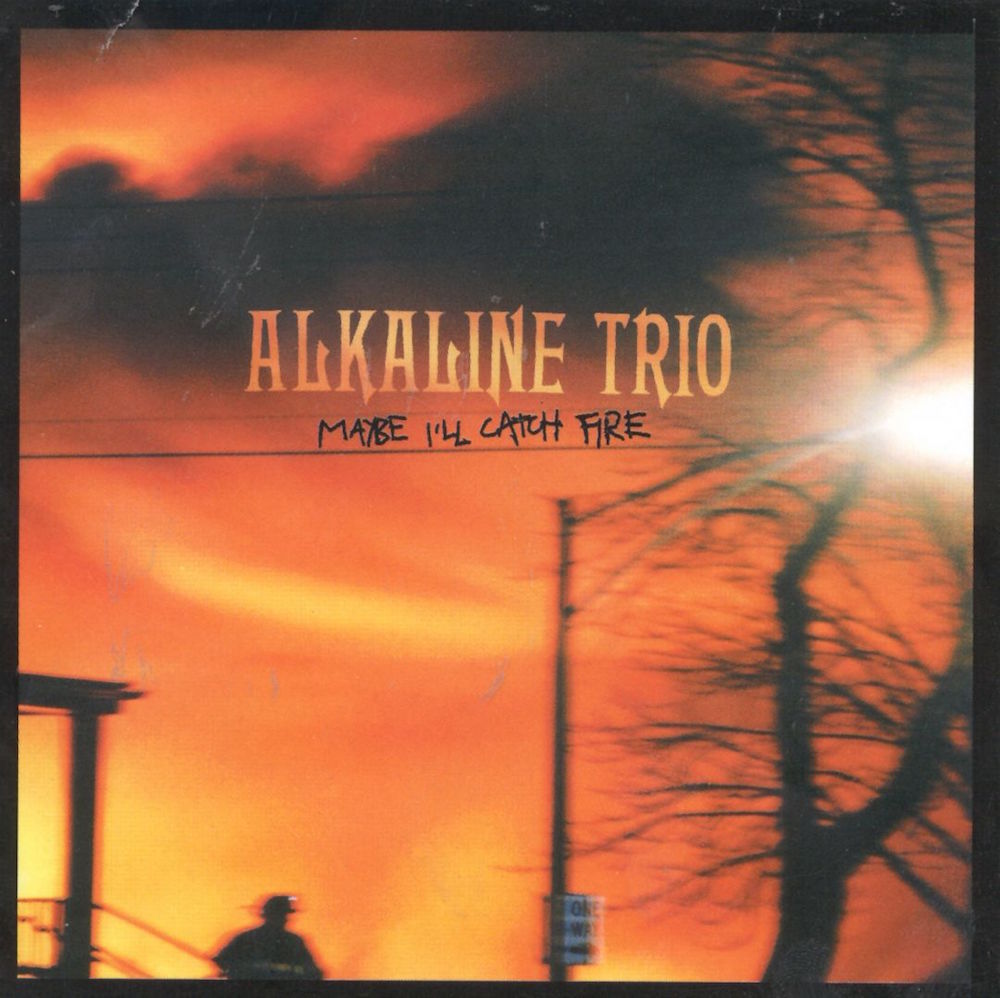
Matt Skiba: That was the last record we made with Glenn Porter playing drums. I’m really proud of it, but it just happened so quickly that I kind of barely recall it. We wrote it in the basement of a house Danny was living in at the time on Albion Street in Chicago; there used to be shows there, we used to rehearse there. We wrote the record in like two weeks, and already bad blood was brewing with Glenn. It was a difficult process. We did it really quickly, and we didn’t know for sure that it was going to be our last record with Glenn but, in retrospect, it feels kind of thrown together. I’m still really proud of it, and it’s a lot of fans’ favorite record, and some of my favorite Trio songs are on that record, but I have to choose. But there was turmoil brewing and it wasn’t the most enjoyable process. Not for me, anyway.
Noisey: At the time, you guys were playing with a lot of weirder, art-rock bands in Chicago like Sweep the Leg Johnny and Lustre King. It feels like that sound bleeds into this record a little bit. Was that intentional or just a natural evolution?
One of the earliest Alkaline Trio songs [“Goodbye Forever”] references a band called U.S. Maple, and the Touch and Go, Steve Albini, indie-punk scene, all that stuff is really what we were all listening to. We were fans of Green Day and Nirvana or whatever, but the bands we really loved were Chicago bands that didn’t really sound anything like Alkaline Trio. We liked, and still enjoy, touring with bands that don’t really sound like Alkaline Trio.
We kind of did it by the seat of our pants, but we were definitely entrenched in Chicago indie rock. We were going to see Shellac and Tar and U.S. Maple shows, and I think a lot of those bands influenced how that record sounded. I know it wasn’t intentional, but I take it as a compliment.
Did you feel any pressure to follow up Goddamnit given how much buzz was building around the band?
That early on in Trio’s career, our initial goal as a band was to tour and play shows where 300 to 500 people would show up. I remember me and Danny went to a Superchunk show when we were all in Chicago and we were like, “Man, if we could play other cities and have this many people show up, that’d be the dream.” And we were trying for that, but we were pleasantly shocked when that started happening. And that started happening when we were touring on Maybe I’ll Catch Fire. The band started to get bigger, and we weren’t very conscious of a direction. We were just enjoying being on the road, writing, and playing. That’s never changed.
7. Good Mourning (2003)
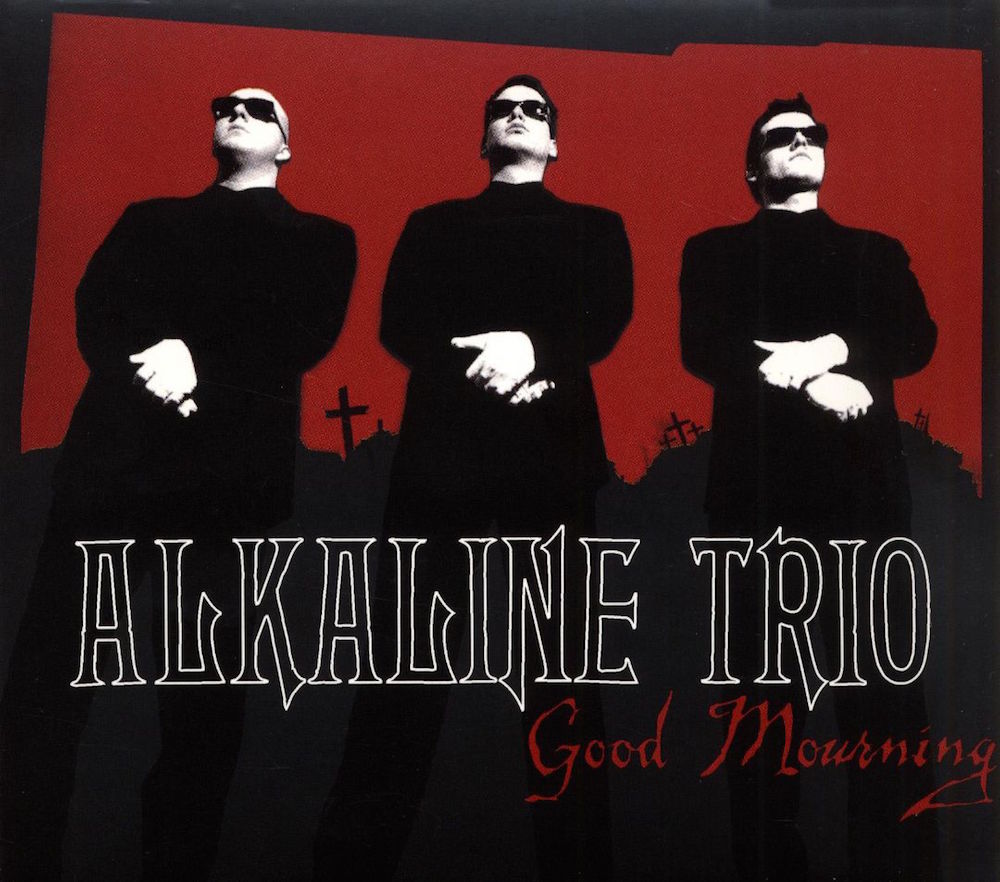
For me, it’s all about the process of it and how much fun we had doing the record. I fucking hated making that record. Musically, I’m proud of it—I’m proud of all our records—but I had problems with my throat. I was living in Oakland, but we were recording Los Angeles, and it took me so long to get the vocals done. They had this real raspy quality that I’m glad people dig, but it’s really hard for me to listen to it because all I remember is how much of a struggle it was to get done. Luckily, I figured out what was wrong and what needed to be fixed but, at the time, when I didn’t know, it was the most frustrating, borderline heartbreaking time I’ve ever had. It’s a fucking drag when the singer can’t sing. It’s a long day for everyone. I was throwing shit, punching holes in walls.
Since its release, people have really taken to this record. Has that made it easier to go back to, or do those feelings still linger for you?
It still lingers to this day, that’s why it’s number seven.
6. Agony & Irony (2008)
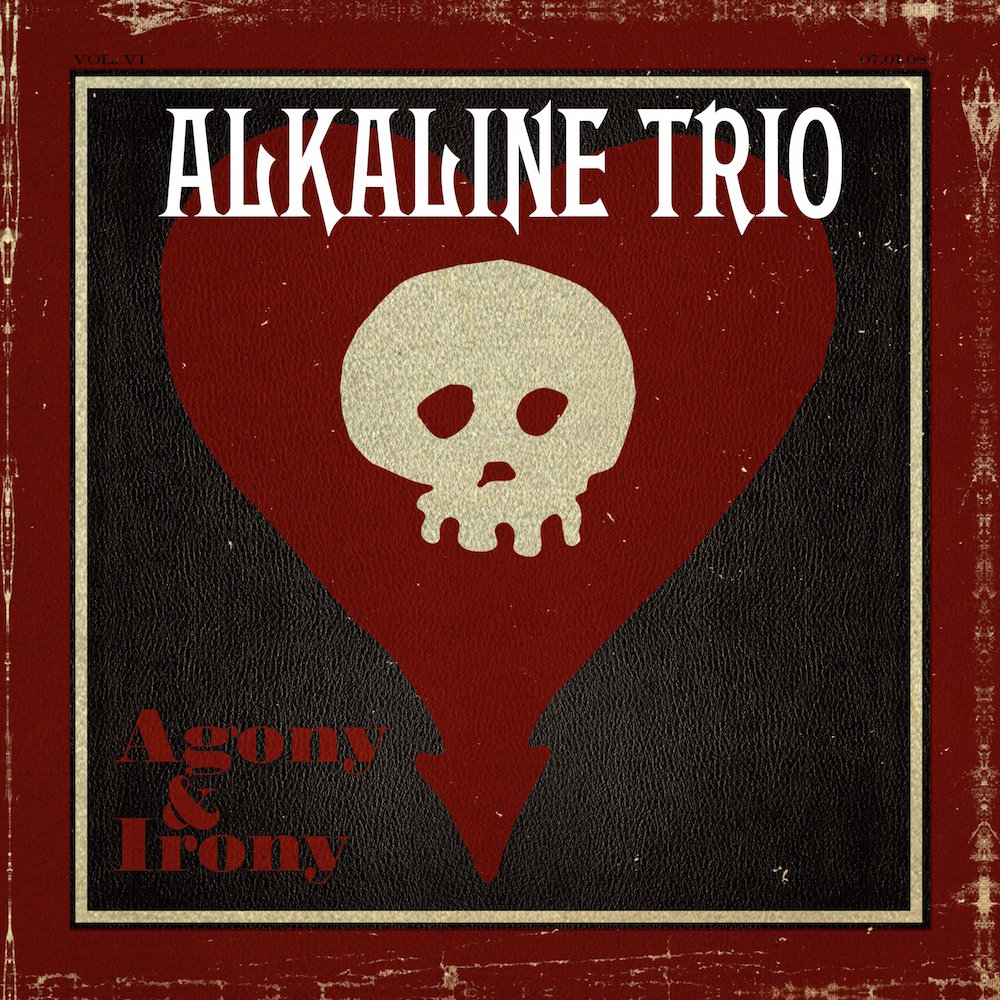
I was talking to our manager about this interview and it’s like picking your favorite kid or something. It’s hard, and Agony & Irony was a blast to make, but it was the first time we worked without [producer] Jerry Finn, because he died. We had the pleasure of working with Josh Abraham, and everyone who was involved was amazing, and the studio was beautiful, but sometimes I’d be driving into the studio and having these thoughts of, “I’m not going to see Jerry today.” So that was weird. It didn’t take away from the experience of making the record, but it was just odd. I’m very grateful to everyone who worked on the record for helping us get through that in a healthy way. If Jerry knew we were wasting time shedding tears over his absence, he would have been pissed. It was just a struggle, emotionally.
This was your major label release, so did it feel like you had a chance to take things to another level in spite of some of that negative energy?
It’s a common misconception—and I’m not saying you have this one—but, with the exception of Asian Man and Johann’s Face, we’ve been on labels that had money to put into records. Being on Epic, it wasn’t like we got signed to a multi-million-dollar deal. We’ve always been lucky enough to do what we wanted and, though we’re a three-piece band, we’ve always tried different things. It’s not like, “We’re on a major label now. Better step it up and put a bunch of fuckin’ instruments on it.” We did that because we wanted to.
One of my favorite Alkaline Trio songs is on that record: “I Found A Way.” We had Douglas Pearce from Death in June read from Dante, and it caused some controversy, as we knew it would. I’ve known Doug for many years, I’m a fan of Death in June, I know where his heart is, I knew he’s not a hateful person. We always had a kind of nefarious subject matter, and having Doug on the record, Andy Gershon, who signed us to Epic, was like, “We’re getting a lot of hate mail from people hearing that this guy is on your album. As long as you’re cool with it, we’re cool with it. Are you down to take heat for having this guy on the record?” And absolutely. I wasn’t gonna ask him to be on the record if I thought we were doing something wrong. And if anybody wanted to talk to me about it, they were free to. That was a very un-major-label thing to do, but we’ve always had artistic freedom, whether it’s that or having a bunch of layers on songs.
At the time, you guys were engaging with your fans pretty actively with the Blood Pact fan club. Did seeing some negative reactions influence how you felt about the album?
I don’t really give a shit, honestly. We do what we do. I think that is us marching to the beat of our own drum. If you don’t like it, don’t buy it. If you like it, thank you for listening. If you don’t like it, I don’t fucking care.
5. From Here to Infirmary (2001)

At this point, it’s all in retrospect. From where I am now… Fuck it. Whatever. I’m not going to put a disclaimer on each of these things.
I’m putting it at number five because [of] Mike Felumlee [drummer]. It was a similar thing with Glenn, when, once we got out and started touring, it felt like it had run its course. When we made From Here to Infirmary—I love that record, I’m fuckin’ proud of that record, and it’s a lot of people’s favorite—but with that record, the fact that Mike was on that record, I’m not trying to talk shit on Glenn or Mike or anyone, I’m just being honest because we’re talking about it, I’m thankful we put that record out, but I’m also thankful I don’t have to play in a band with that guy anymore.
Fair enough. When this one came out, you guys charted on Billboard and things started to take off. How did it feel to have the band be on such an upswing and see all this work pay off?
It was incredible. We were in Rolling Stone and shit. I think Rolling Stone maybe reviewed it? That was the first album we put out with Vagrant and it was a turning point—an unintentional turning point. Shit just kind of blew up when that album came out. It was like in The Jerk when the phonebooks came in.
It was also the first time we worked with Jerry Finn. We also made the record at this beautiful studio outside of Minneapolis called Pachyderm. It’s where Nirvana made In Utero—the place was haunted as shit, and we had so much fun making the record. I love the songs, I had a blast making it. Matt Allison produced that record, Jerry Finn mixed the record.
My memory ain’t what she used to be, so I hope I’ve got the right record for the right studio. We’ll just pretend that I’m right.
Well, that’s convenient, since you’re right.
It was really fun making that record. It was just a trip to have those things start to happen with our band. We were working in this bitchin’ studio in the wilds of Minnesota, mixing with Jerry Finn, playing bigger rooms, it was crazy. It was like, “Well, I guess people care about our band.”
4. This Addiction (2010)
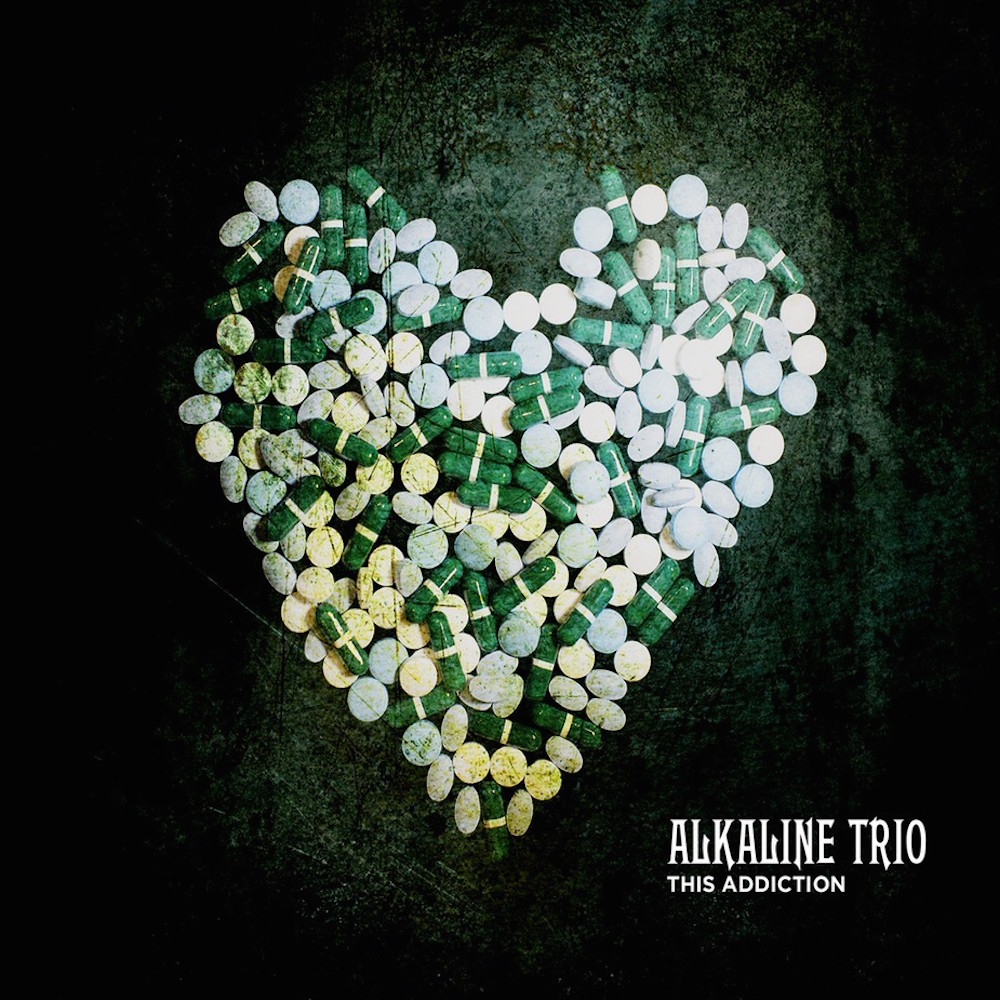
We worked with Matt Allison again. We had worked with Finn for several years and went back to Matt Allison, went back to recording in Chicago. That record was a total blast to make. It was definitely some Rolling Stones shit going on in that studio. It was the most debaucherous making of a record we’ve ever had.
Wait, really?
Oh fuck yes. It was a really good time. But it was the beginning of the end for our hard partying days, that’s for sure.
Was that just a facet of being back in Chicago and all living in the same apartment again?
We had made a couple of really big records—”big” meaning production-wise—and I feel like This Addiction was back to basics. Matt’s not a basic guy, and not a basic producer, but it’s more back to our roots than back to basics, I guess. It was a little more like three guys in a studio. The three of us living in a flat together and partying together, it was a cool time. It was a beautiful time of the year in Chicago and I would ride my bicycle to the studio everyday. So for as unhealthy as a lot of it was, I rode my bike everyday. Everyone has a different definition of what rock ’n’ roll is, but I think it would have been a waste to not have done what we did when we made that record. It was a wild time, and nothing negative, but I’m definitely thankful that we got through it somewhat unscathed, and I’m really proud of that album.
3. My Shame Is True (2013)

That record we made with Bill Stevenson out in Fort Collins, Colorado, and that was so much fun. One of the guys from Teenage Bottlerocket lent me his Harley because they left on tour, so I would wake up in the morning and go riding in the Rockies every morning, which was amazing. Fort Collins is such a cool town, and there was a bar we’d go to every night to eat and drink. It was kind of like we moved into Fort Collins for a month. And we’re working at the studio with fucking BIll from Descendents and Black Flag and ALL. Bill is one of our heroes and Bill is one of my best friends. I fucking love Bill Stevenson and I fucking love that record.
Lyrically, I know this record was really personal for you. Did it make it a little easier to make a record like that when the rest of the experience was so positive?
It wasn’t one of the easier times in my life. I was going through a break-up and was getting back together with that same person—who is on the cover of that album—and the whole record is about her. It was cathartic to write about exactly what I was going through—literally. People were like, “What’s ‘turquoise pumps’? What the fuck is that?” And it’s like, she was wearing turquoise pumps. It’s not a metaphor. Vinyl pants and turquoise pumps were what that motherfucker was wearing, and it was a good look, so it made it into the song. It was a lot more literal. We did that a lot more at the beginning of Trio’s career more often, and I always try to remember to do that. It’s the stranger-than-fiction kind of thing. Write something specific because it’s real, and you’re the only one who is gonna know what that was about.
I love that album, and I love those songs to this day. I think being away from home and having some perspective, we’ve been in some really beautiful situations to make a record, even if what you’re going through isn’t that beautiful of a feeling. Even the rough things, going through the stuff with Glenn or with Mike, I’m so grateful for both of those guys, and if they needed my help, I would help them. It’s just a growing process. Some things just don’t work out. It’s like relationships. I would never talk shit about any of my exes. We’re not together anymore; that says it right there. I’m thankful for everything good and bad that happened to our band. All the trials and tribulations got us to today.
2. Crimson (2005)
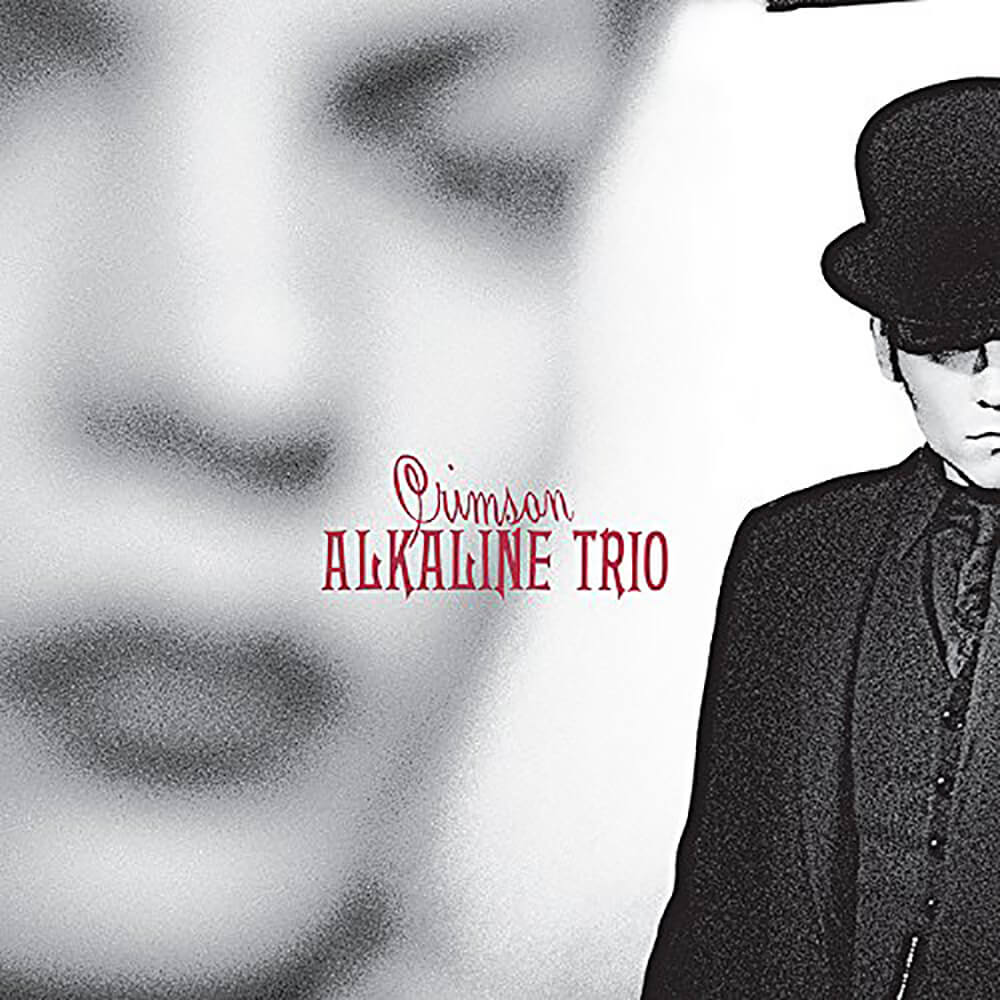
Crimson is one of my favorite Trio records. It’s the last record we made with Jerry Finn and, for a while, I couldn’t listen to it. There was so much of Jerry Finn in the production. Now, when I listen to Crimson, sometimes I think about Jerry, and I miss him, but for the most part I’m just really grateful that we had the opportunity to work with the most amazing producer for our genre that there’s ever been. I’m really thankful for that album, and I’m really thankful for Jerry’s friendship. He was one of my best friends.
Sonically, this record is much bigger than the ones that came before it. What were you trying to get across with it?
It’s never been about what we want others to see, it’s about what we want to see; it’s about what we want to do. We only have a career because of our fans, but we have to keep making music for the reason we started making music. Hopefully you’re able to make a record that fans love but, for Alkaline Trio, we have to make a record that we like first. We have to feel like this is a step in our career.
We wanted to do something different. Crimson was the longest pre-production we’d ever done, we dissected all the songs, and we spent more time than we ever had making that album. We made that record in Conway Studios, which is the prettiest studio I’ve ever worked in. At Conway, there are three or four studios, and there’s a courtyard so all the studios are sundrenched. You can see the hustle and bustle of all these people working in the studio. It’s just really inspiring to work there.
Jerry always went to bat for us. He mixed Infirmary for nothing because he loved our band. I can say that now, but I never would have told anybody that before. Jerry did amazing things for us. He got us an amazing deal at Conway, and I’m still convinced he paid for some of that because it was a really, really nice place. It was the best time I’ve ever had in the studio.
1. Goddamnit (1998)

When we play that record—any song off that record—it just hits. We made that record in ten days for $900. We never in a million years… I didn’t think I’d be where I am right now. I don’t want to sound like I’m gloating, I’m just really grateful. That record gave me and my bandmates the career we now have.
Prior to this, you’d been a drummer in bands, but this was your first album front and center. Did it feel weird to be putting yourself out there in that way?
It really wasn’t that big of a thing. It’s weird. I had an idea that… my grandmother and my father have—and people will be like, “Oh, that guy’s fucking nuts”—I kind of have a form of ESP. When I was a kid, I had visions of sitting in a tour bus, and I had never been in a tour bus in my entire life. I remember the first time we toured in a bus I was like, “I remember this from when I was a little kid.” I always knew that this is what I would do. When I was a kid it scared me, but playing music for a living always seemed like a choice. I didn’t know if it was going to be Alkaline Trio, but I’m really grateful that it was, with me singing and playing guitar, getting comfortable with it and getting good at it—or at least confident with it.
Making Goddamnit, it was pretty Spartan and punk rock. It wasn’t overthought by any means. The first thought was the best thought, and that’s the best advice I could ever give anybody else. Jerry Finn came up with that phrase, “First thought, best thought.” Don’t overthink it, just do it. That record was done like that. I didn’t have time to think about it, so much so that it wasn’t until we started playing shows in front of people that I was like, “This is fucking terrifying.” But I also realized that vision I had of touring as a kid, it was there. You can either tremble in fear or do your best to nail it. It was a huge change, but you’re forced to get used to it real quick.
David Anthony has a podcast about Alkaline Trio as well as an ALK3 tattoo. He is on Twitter.
More
From VICE
-

Screenshots: Techland, Sega, Eidos Interactive -

(Photos via Green Lake County Sheriff's Office; Mlenny/Getty Images) -

(Photo by sdominick / Getty Images) -

Nick Fuentes, a white supremacist streamer and US social media pundit, appears to mace 57-year-old Marla Rose, a 57-year-old on his doorstep on Sunday, November 10 (Imagery courtesy of Marla Rose)
